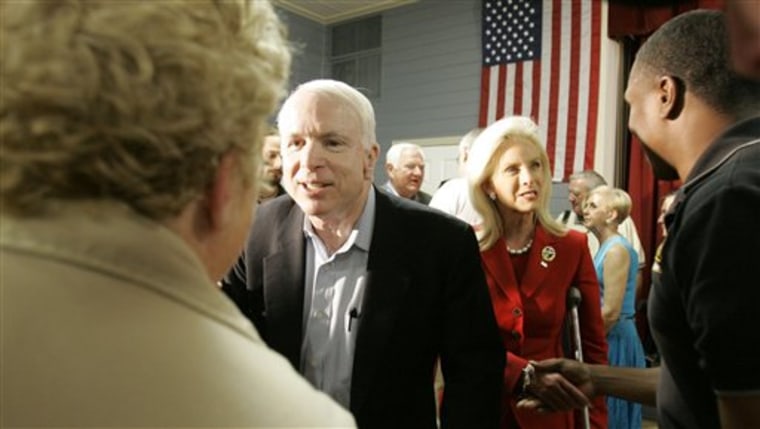Some flit between stops, fueled by homemade granola. Others plod along, more tortoise than hare.
Across the presidential field are candidates of all metabolisms, Democrats and Republicans who find common ground in the need to meet potential voters, court money to fund their campaigns and enlist the support of key special interest groups.
Where they can differ is in the getting there.
Republican Mitt Romney exhibits the energy of a hummingbird, often starting at 7 a.m. and finishing at 10 p.m. The former Massachusetts governor can pack six or seven public appearances in a day, with radio interviews and staff calls along the way.
Little real downtime
Republican rival Fred Thompson takes a more leisurely pace, with just two scheduled public stops in Iowa the day after he declared his candidacy on NBC's "The Tonight Show With Jay Leno."
Last week, the former Tennessee senator dropped out of public view for a day, prompting the Democratic National Committee to jab in a release, "Thompson Tuckered Out After Only a Week of Campaigning."
A Thompson aide said his boss's day is full of private meetings and impromptu stops that don't always appear on his public schedule.
Campaign aides said few if any candidates have leisure time.
"Running for president is grueling, and I don't know how any of the candidates do it," said Eric Fehrnstrom, a Romney spokesman who travels with the 60-year-old candidate.
Bill Burton, spokesman for Sen. Barack Obama, D-Ill., said of his boss's hectic schedule: "There are some folks in the race who have been politicians for 10 or 20 years and many people know them. For Obama, who's relatively new to the national stage, he has to meet and introduce himself to as many people as possible."
Logistics and fundraising
Nearly all the candidates get a boost from charter jets, which help them avoid congested airports and canceled flights. Obama and Sen. Hillary Rodham Clinton, D-N.Y., operate within the cloak of Secret Service protection, allowing them to move with military precision but costing them precious seats on their campaign planes.
Sens. Chris Dodd, D-Conn., chairman of the Senate Banking Committee, and Joe Biden, D-Del., chairman of the Senate Foreign Relations Committee, are among the six senators and four House members running for president who are hemmed in by the congressional calendar. Their participation in hearings and other Capitol Hill business restricts their campaign appearances, although it can offer them a broader audience than they might otherwise find on the hustings.
All the contenders tend to fade from public view the third month of each quarter, when they concentrate on closed-door meetings with their financial supporters. The money they raise is publicly disclosed the middle of the following month, providing a crucial index of each candidate's political health.
A recent snapshot of candidate schedules shows the most consistently prolific campaigners include Romney and former Sen. John Edwards, D-N.C., both of whom are out of office, as well as Dodd, who sometimes brings his young children on the road as he spends back-to-back weeks on the trail.
He is not alone in having young children: Edwards is often accompanied by his son and daughter, as are Thompson and Obama.
"We're cognizant of the fact that he has a two-year-old and a five-year-old," said Dodd spokeswoman Colleen Flanagan, who said the campaign often looks for ways to get the senator home or his family out on the road if their separation has been lengthy.
Security and Granola
Sen. John McCain, R-Ariz., began a weeklong "No Surrender" tour through early voting states on Sept. 11. Former New York Mayor Rudy Giuliani, also seeking the GOP nomination, had a burst of public events in the days leading up to Sept. 11, the sixth anniversary of the terrorist attacks that targeted his home city and boosted his national prominence such that he is now the national front-runner for his party's nomination.
More typically, Giuliani's day will include one or two splashy public events, followed by an undisclosed number of private meetings with donors and supporters. One day in August, he flew back and forth to Saratoga, N.Y., so he could attend a fundraiser amid a New Hampshire campaign swing.
Giuliani's events frequently begin at 9 a.m., two hours after Romney is often on the trail.
Clinton's appearances commonly come in spurts, such as a Labor Day barnstorming tour with her husband, former President Clinton, that hit New Hampshire and Iowa, followed by only a pair of public appearances in Atlantic City, N.J., and Boston at the end of that same week. That doesn't mean Clinton was not busy that Friday: After the former first lady addressed an AARP conference in South Boston, her motorcade was spotted dashing through the city as she attended private meetings and at least one fundraiser.
Romney starts most days with granola baked weekly by his wife, Ann. He carries it in one-gallon Ziploc bags.
"It's not unusual to find ourselves in four states in a single day, particularly in the last month of a quarter, when the emphasis is on fundraising," said Fehrnstrom.
Todd Harris, a Thompson spokesman, bristled at suggestions his candidate doesn't maintain a similar pace.
He said the day after Thompson launched his campaign, the candidate began with an appearance on ABC's "Good Morning America" and didn't get to bed until nearly midnight.
"If we start at 5:30 in the morning and end after 10 p.m. at night, I'll let our schedule speak for itself," Harris said.
